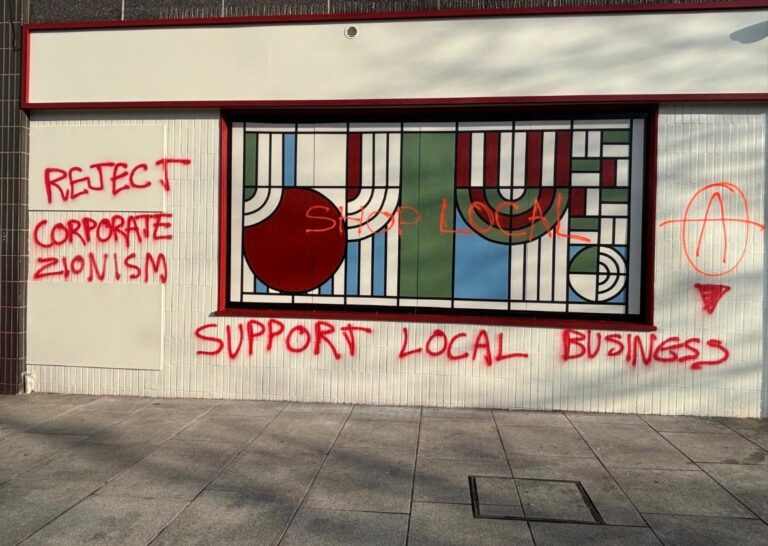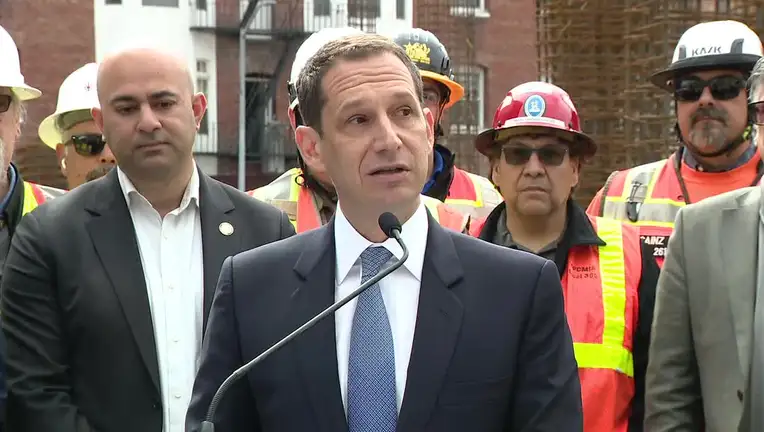 The following is an APP article: The sight at the end of a loose-dirt path off Vermont Avenue has done little but alarm some who have come across it. There, in the trees, a large hole has been dug from which thousands of black trash bags overflow.
The following is an APP article: The sight at the end of a loose-dirt path off Vermont Avenue has done little but alarm some who have come across it. There, in the trees, a large hole has been dug from which thousands of black trash bags overflow.
“I was like, this can’t be legal,” said Scott Wegeman, whose backyard on Albert Avenue is directly behind the burial site. “You can’t just treat your property like a landfill.”
While perhaps temporarily unsightly (the hole was to be covered by the end of the week), the decades-old tradition is religiously unavoidable, Orthodox leaders contend. That is because the bags’ contents are what strictly observant Jews in Lakewood cannot burn or toss into trash cans: Hebrew text, Torah scripture, sacred garb — no longer usable but still holy.
So it is buried, most every year, in backyards, with coffins, under foundations and in open lots — anywhere a patch of earth can be found. The practice usually coincides with Passover, since that is when Orthodox families do their spring cleaning.
This year, in an attempt to organize and facilitate the custom, a local rabbi secured a 100-by-150-foot piece of undeveloped land donated by an individual and had it deed-restricted so nothing can be built there. This week, he dispatched youth under his supervision to collect the items from Orthodox households, bring them to the site in rented trucks and place them into the 40-by-60-foot pit.
“It doesn’t hurt anyone and it’s a holy thing,” said the rabbi, Chaim Abadi, who got a site plan approved by the township zoning office.
But for those people unfamiliar with the tradition, such a scene might scream unlawful dumping. Complaints were made with police, the Ocean County health department and the state Department of Environmental Protection. Even some officials, such as Committeeman Raymond Coles, were unaware of the practice.
On Thursday, Police Chief Robert Lawson sent an e-mail to township officials explaining it to them.
“Based on those calls we did refer this to the county and the DEP,” Lawson said, despite having become familiar with the routine after so many years. “They did come down and we discussed it and found that nothing was done that was illegal or inappropriate.”
DEP officials tell a different story.
“They do not have a permit,” department spokesman Larry Hajna said. “We are investigating unpermitted activity.”
Later Thursday afternoon, Abadi confirmed he was issued a violation notice from the DEP for the site. But details about the violation were not available Thursday evening.
Officials for New Jersey American Water, a company that provides drinking water for the township and has a well that sits about 300 feet from the site, said they were not going to react until a ruling is made.
“We’re going to wait for the (DEP’s) determination to decide whether this is something we need to be concerned about,” company spokesman Richard Barnes said prior to news of a violation.
Yet religious leaders stress their intention is to benefit the community by isolating the practice to one place deep in the woods, rather than burying in piecemeal fashion. Abadi said he hopes to reuse the site in future years.
Longstanding but largely unnoticed, the practice used to occur mostly in cemeteries. It is considered an honor to be buried with sacred texts, Rabbi Moshe Zev Weisberg said. But as Orthodox populations exploded, more and larger spaces were required.
Sites have been dug in the mountains in North Jersey, in Jackson off Frank Applegate Road, and in Lakewood off East 7th Street. Private companies have sprung up to haul the items away for small fees. But not until now has it become a public controversy.
Abadi said, based on complaints and the DEP violation, no more bags will be unloaded off Vermont Avenue.
“People have gotten a little crazy about it,” he said.
(Source: APP)











16 Responses
It’s called the “Oh! You Can’t Do THAT” attitude. I come across it all too often.
biggest problem is probably the use of all those black contractors’ bags – if the contents were simply placed in brown paper leaf bags, it would all compost itself fairly rapidly – those bags will not decompose for years
The plastic bags are not shaimos why take advantage – bury the real shaimos not the bags and is it at all possible that the bags also contain other papers that are not shaimos that maybe they are just papers?
what ever happened to the practice of kevurah in a real cemetery -and only burying things that REALLY are unusable. I observed how much is “deposited” in the “shaimos” trucks that park on the street corners, decorated with parking tickets. Much of the content is in perfect condition, and just nuisance material. Is this what we’ve come to, shaimos being discarded like common household trash? Is there no more kedusha? What about a gemach to benefit those need (for children or themselves) and cant afford to pay for new? Isn’t recycling in lieu of burying a wiser idea?
They should have used paper bags, which, like the shaomos, disintergrate. They are also not as noticible as the black plastic bags.
From an environmentalist view plastic can take thousands of years to disintegrate.
Although it appears steps were taken to make it legal, this is a chillul Hashem. ‘Just goes to show us how careful we have to be.
it is trully amazing that one tries to play by the rules , yet one hand of goverment does not tell the other hand of govermant what is going on and therefore we have these probloms . it is not a wonder why people like to take shortcuts sometimes weather it is right or wrong if this is what they have to put up with.
Probably more than 90% of shaimos isn’t actually shaimos and can be discarded. If it doesn’t have the name of Hashem name then it does not have to go to shamimos, although it is respectful put it there. I suspected that this might be becoming a problem. Consider the massive amounts that the schools put in there, but again most of that is for not official shaimos.
It is supposed to be genizas shaimos. The objective is to preserve the shaimos, not to accelerate its disintegration. That’s why it is specifically packaged in plastic bags, not in paper or something that disintegrates. Ayain Mishna Berura 154:24.
#5, faylamed (and #2 for that matter): Yet again, your lack of halacha shines through (Florida man and Pesach food). Read #10 a few times. Please try not to comment so fast next time.
Why do all the amei ha’oretz comment first?
#7 – lib: Chillul Hashem doesn’t mean when Jews do certain actions that are deemed improper in the eyes of others. If they followed the law, there is no chillul Hashem involved. I suppose wearing tzitzis in public, if viewed improper by others, would also be a chillul Hashem? Perhaps you should be slower to cast poor light on others if your grasp of halacha is non-existent. Chillul Hashem is a real term geared to a finite area of Jewish law, not something generated by harsh public opinion.
doesn’t all this disintegrate? Maybe the bags not, but the sefarim do! Soooo why the headaches?
What appears to be of [potentially] legitimate concern are:
a. The lack of a proper permit as per DEP. While it is true that Government is often confusing, it is still — ultimately — the responsibility of the “dumper” to figure out what is proper. If this was truly simply a mistake, then some appropriate “plan” will be worked out with minimal penalties imposed.
b. Of more concern is the issue of [non-degradeable] plastic. Regardless of the Halachic directions (which, I am sure, were adhered to), one has a responsibility to the [secular / non-Jewish] society in which we live. The concern about using these plastic bags is NOT a matter of “religious discrimination” but the concern about the very real harm to the environment that can be caused. Being insensitive to such concerns probably DOES constitute at least a potential Chillul HaSham about which a shaila should have been asked BEFORE the burial was performed. This is NOT simply a matter of “Harsh Public Opinion” but rather the very real perception that Jews DO NOT CARE about anyone else. In fact, such a view (that Jews do not care about anyone else) is also against our Halacha and Hashkafa. In fact, even if no law was borken, I would still suggest that a Shaila would have to be raised since the negative perception in this case is so destructive. This is (it should be obvious) different from “wearing tzitzis in public” where the “negative opinion” is really not relevant or legitimate.
Addendum:
Please note that I am not claiming for certain that there was a Chillul HaSham if all legal moves were followed… I am stating that there appears to be the POTENTIAL for a Chillul HaShem about which a Shail should be asked.
One other addendum:
If the neighbors feel that their property values will be harmed by this action, then it seems to me that it is the responsibility of those who did this Geniza to ensure that there is — indeed — no harm caused by this action.
Regardless of the [secular] “technical law”, causing harm to others is likely to be considered a Chillul HaShem. Again, at the very least, a Shaila needs to be raised.
As a side note, if wearing Tzitzis in public would actually CAUSE HARM (though, I admit, that I have difficulty seeing how that could happen), then I believe that a Shaila would have to be asked in that case, as well. Again, I am NOT claiming that there IS a Chillul HaShem in such an instance — but there is certainly the POTENTIAL for Chillul HaShem.